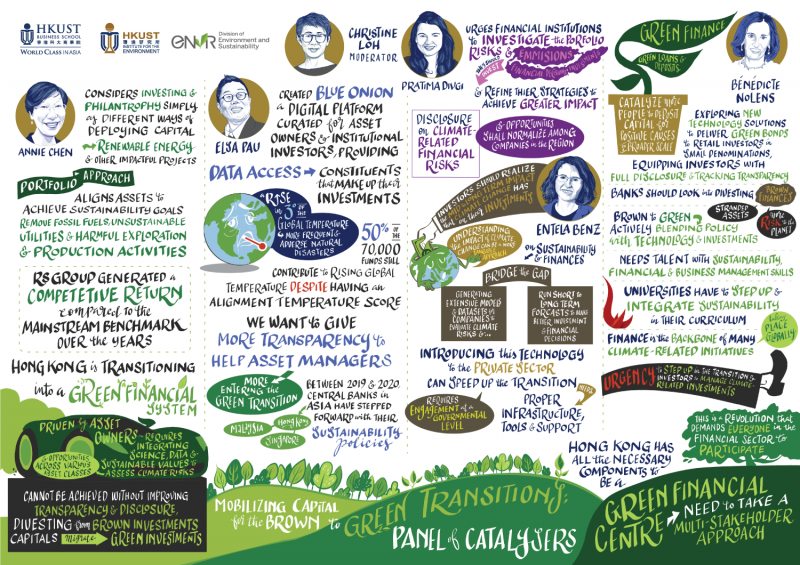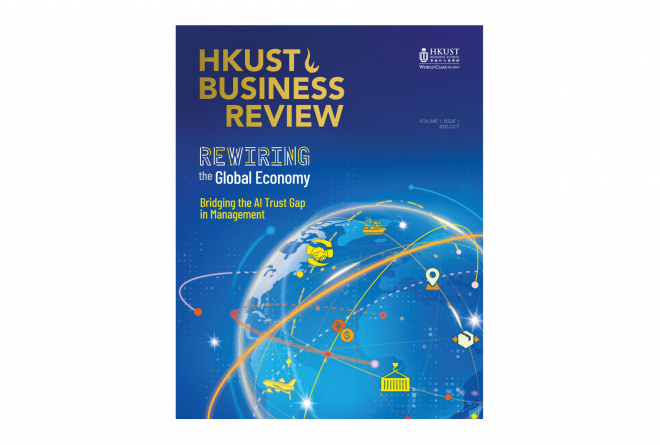 Hong Kong’s financial system is ready to go green. Asset owners are increasingly driving this revolution. Yet a successful transformation requires integrating science, data, technology, and sustainable values to assess climate risks and opportunities across various asset classes.
Hong Kong’s financial system is ready to go green. Asset owners are increasingly driving this revolution. Yet a successful transformation requires integrating science, data, technology, and sustainable values to assess climate risks and opportunities across various asset classes.
On January 28, a group of Hong Kong-based leaders in green finance shared valuable insight in the webinar titled Mobilizing Capital for the Brown to Green Transition: Panel of Catalyzers. Moderated by Christine LOH, Chief Development Strategist at the Institute for the Environment at HKUST, the panel featured Annie CHEN, Principal and Chair of RS Group; Bénédicte NOLENS, Head of BIS Innovation Hub, Hong Kong Centre; Elsa PAU, Founder and CEO of WealthAsia Group; Entela BENZ, Adjunct Associate Professor, Department of Finance at HKUST and Co-founder of Intensel Ltd; and Pratima DIVGI, Director of CDP Hong Kong, Southeast Asia, Australia, and New Zealand.
Chen is one of the earliest green asset owners in Hong Kong. She began thinking about how to invest for good 20 years ago. With a total portfolio approach and solid divestment strategy in place, Chen considered “investing and philanthropy simply as different ways of deploying capital.” Where many asset owners question the return of green investments, RS Group generated an average of 6% return between 2018 and 2020. Chen’s success in green finance is not only encouraging but also paves a way for other asset owners to follow suit.
As more asset owners swap “profit” for “purpose” and “return” with “impact”, more transparency is required for investors and asset managers to recognize the impact of their work. During the height of COVID-19, Pau explained that funds without a solid ESG approach had a high mortality rate, without asset managers fully understanding all the constituents in their funds.
Pau’s curated digital platform Blue Onion provides asset owners and institutional investors with full transparency on all the constituents that make up their investments. Blue Onion also helps asset managers identify underlying brown investments that are funding harmful activities towards the planet.
With more asset managers supporting green finance, central banks in Asia have stepped forward with their sustainability policies. Despite the pandemic, the number of companies reporting on CDP’s platform in the region increased by 20% – a promising figure that disclosure on climate-related financial risks and opportunities among companies in the region would normalize. Divgi urged financial institutions to investigate the portfolio-level risks and emissions that their investments and financial decisions generate, divesting from harmful investments and refine their strategies to achieve greater impact.
Investors should also realize the mid to long-term impact that climate change has on their investments. Benz suggested that understanding the impact of climate change could be a more tangible approach. Her innovative work at Intensel generates extensive data, helping companies evaluate climate risks and make short to long-term forecasts for better financial decisions. Introducing Benz’s technology to the private sector could tremendously speed up the brown to green transition. But the public sector must bring these solutions with proper infrastructure, tools, and support to drive momentum.
Looking ahead, banks are also tapping into the opportunities that green finance brings, offering such products as green loans and deposits to catalyze more people to deposit capital on a broader scale. Nolens spearheads an innovative project that could deliver green bonds to retail investors in small denominations, equipping investors with full disclosure and tracking transparency. However, she also warned that banking portfolios were still lagging behind, stressing the need to divest from brown finances, which are becoming stranded assets and posing more risks to the planet.
Finance is the backbone of many climate-related initiatives taking place globally, Hong Kong has all the capabilities. However, it will need a multi-stakeholder approach for the transition to be successful. The industry also requires talent with sustainability, financial, and business management skills who can continue to drive the transformation. Universities, including business schools, must step up and integrate sustainability in their curriculum.
Click here to review the webinar.






